September 16, 2023
A deeply personal connection to the Burger Baron franchise led filmmaker Omar Mouallem on a meaty voyage of discovery
In May 2022, Omar Mouallem was weighing the pros and the cons of whether to hit send on a submission application for the Toronto International Film Festival. The stakes were high. This was a project almost a decade in the making. From the award-garnering magazine article he first wrote in 2013, titled “Will the Real Burger Baron Please Stand Up?” to his 45-minute television special, The Last Baron, that aired on CBC in Sept 2021, Mouallem has continued his journalistic dive into his own family’s Lebanese- Canadian connection with the restaurant chain that speckled Alberta’s roadmaps. Thanks to a successful crowdfunding campaign following the CBC television premiere, Mouallem had been expanding the story into a one hour, 40-minute feature documentary called The Lebanese Burger Mafia.
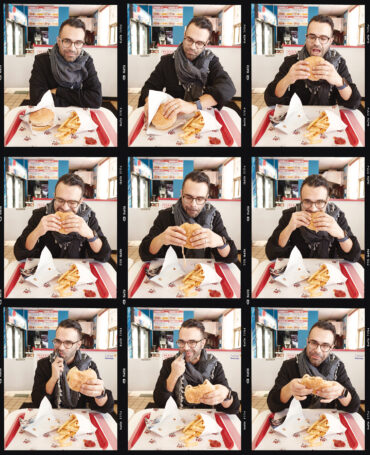
Mouallem was basically born into the subject matter. His parents opened their Burger Baron in 1987 in High Prairie, Alta., where they settled after immigrating. “The restaurant changed our lives forever. It moved us from the working class to the middle class,” explains Mouallem in the film, as he narrates over old family photos. “It made it possible for my parents to live out the immigrant dream in Canada.” Like any child and teen would, however, Mouallem resented the endless hours in the restaurant, sometimes washing dishes, while his friends had lives that included things like weekends and vacations. However, he admits to enjoying the ability to win favour with friends by being able to place a delivery order from anywhere in High Prairie, and have the order arrive promptly, no charge.
It wasn’t until he was in his teens, however, that Mouallem became aware that there were other Barons.
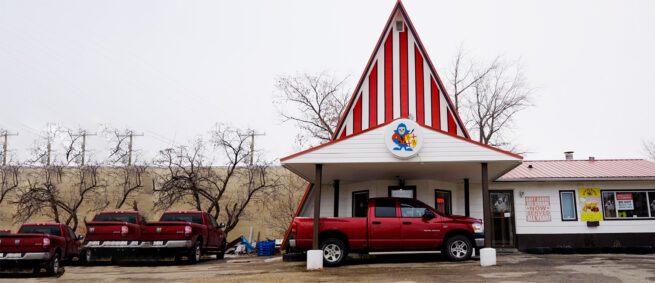
The curious fact that there were other Barons, and that they were also Lebanese, stuck with Mouallem. But at that stage of his life, he was ready to leave High Prairie, and the family restaurant behind. Mouallem left High Prairie for Vancouver Film School to study screenwriting, and then attended Langara College for film production.
“That’s where I became a magazine writer,” says Mouallem. “One of my classmates was writing for The Nerve,” and Mouallem wanted in on the perks of free CDs and interviews with touring musicians for this Canadian music monthly.
Now based in Edmonton, Mouallem is one of Canada’s premier investigative and longform narrative journalists. His work has appeared in Maclean’s, The New Yorker, Rolling Stone and The Guardian to name a few. He was also on the editorial team of Avenue Edmonton (now Edify magazine).
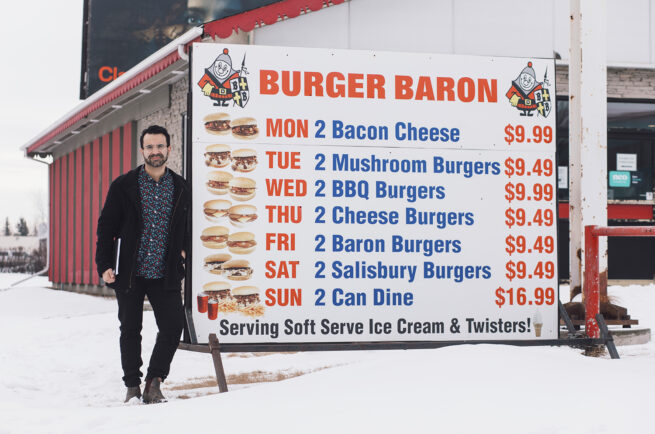
Not surprisingly, when he leaned into his personal history for Swerve Magazine in 2013, it was more than just a quirky overview of the interesting interpersonal dynamics of owners in a waning restaurant chain. It drew interesting connections between the character of these Lebanese immigrants and the reason that no two Burger Barons had the same look, menu, even branding font and cartoon knight logo. Each location is a different take on this loosely controlled brand, which at its heyday, had over 50 locations in Canada and the United States. As he interviews the various barons of this declining empire, Mouallem highlights the chaotic disregulation of everything from the chain’s menu selections to interiors. Many serve pizzas, steak, spaghetti, fried chicken and poutine as well; Lamont has a laundromat; Swan Hills has vegan options; Maskwacis has a bannock burger and a bannock taco.
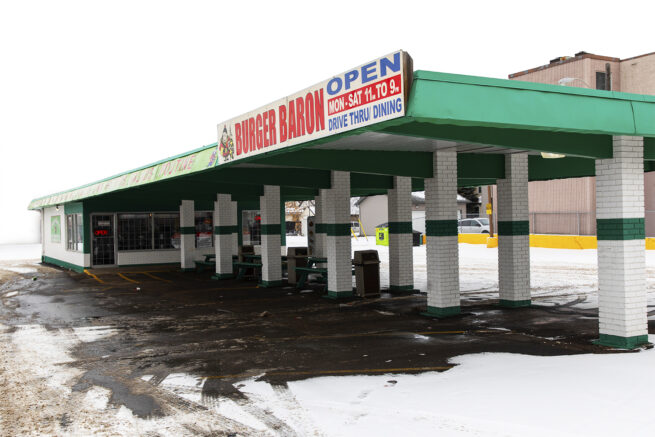
“Lebanese are known for their independence,” laughs Mouallem. But what emerges from these immigration and reinvention stories, surprised even Mouallem. “I knew this was an immigrant success story. But I didn’t know that this was a [Lebanese] civil war story,” says Mouallem.
“From the late ‘70s to the early ‘90s, those were the best times for the Burger Baron. It’s not a coincidence that those dates line up perfectly with the dates for the Lebanese Civil War. And it makes sense: desperate people coming here and clinging onto their best chance for security and a decent life for themselves and their family.” There were no franchise fees to pay, no rules to running a Burger Baron, only that it really should include the trade- secret mushroom sauce for the mushroom burger. Everything else was dealer’s choice.
This much-wider geopolitical angle is something that Mouallem admits would not have come to him unless he’d spent so much time talking to his subjects through the filming and interview processes. Also, being Lebanese and with Arabic-speaking film crew, there was a certain candidness and trust that allowed some of the most emotionally impactful parts of the film.
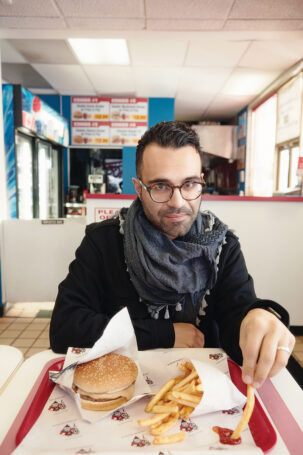
As he edited what he thought was the final film cut in early May 2022, Mouallem had a growing need to close a few more loops. First there was an internal narrative issue that one of main protagonists, Rudy “The Godfather” Kemaldean, sort of disappeared halfway into the telling of the film’s story. Mouallem needed one more day of shoots to get a final interview. And the crowdsourced funders gave Mouallem some feedback, saying the film needed further explanation of the Lebanese Civil War and ongoing current conflicts that was driving this emigration central to the Burger Baron story. The trouble was, Kemeldean and his wife had just left for Lebanon and would be away for several months. And stock footage of war-ridden Lebanon would generally cost about $100 USD per second.
“At that point, I thought, OK, well, I know we can make a better film but we’ll just submit now to TIFF with what we have, or we can give up on that little dream and focus instead on making the best film we can. But it’s going to take months, and we’re going to need more funding.” Mouallem chose the latter. “That’s when we went to Edmonton Community Foundation.”
The $3,000 grant from Edmonton Community Foundation (ECF) allowed Mouallem to hire a Beirut cameraperson who had current street scenes of social unrest and could also capture the final interview with Rudy Kemaldean. “It’s the best stuff in the film,” beams Mouallem. And there is now substantially more archival footage to emphasize the civil war and the conditions that many of the barons and their families were fleeing when leaving Lebanon for Canada.
“We were able to go a lot deeper with our main subject and complete his story and we were able to get to the heart of Lebanon’s civil politics, and that was the final important piece of the story, in my opinion.”
His gamble is paying off already. Having resolved the story gaps and with the feature’s final cut in hand, Mouallem has just inked a distribution deal for the film’s Middle Eastern release, a deal brokered ironically at TIFF. The long road to creating and completing The Lebanese Burger Mafia is over, but clearly, Mouallem’s Burger Baron adventure is far from over.
This story comes from our Spring 2023 Legacy in Action.